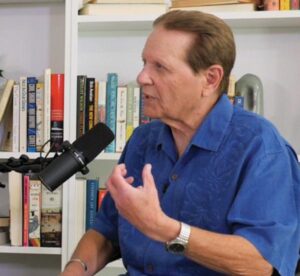Reform vs. Revolution
A Reply to a “Liberal” Critique of My Response to Mark Rudd
by Bob Avakian, Author of The New Communism
April 9, 2020
Recently a middle class professional, who was sent an article of mine (my response to an opinion piece in the New York Times by the former “1960s radical” Mark Rudd),1 replied that despite the fact that he was very busy
I took the time today… to read Bob Avakian’s entire response to Mark Rudd’s NYT piece and I was very disappointed. Despite Rudd’s focus on the issue of violence as a tool for revolutionary change, Avakian hemmed and hawed, trying to have it both ways. He condemned the “madness” of the Weather Underground and called the intended bombing “wrong” but then vaguely criticized the strategy of “non-violence” as being too “limiting.” What????
Apparently, the New Communism would endorse violence once an “actual” massive revolution was underway. If that assumption is true, then why doesn’t Avakian say so instead of being so coy about it in his response to Rudd. Apparently the Weather Underground was only tactically “wrong” in prematurely planning a violent attack.
Very confusing and garbled.
This deserves a response—not by way of singling out this particular person, but precisely because his comments are typical of a whole section of middle class “liberals,” whose basic problem is that, despite inclinations to oppose certain forms of injustice and oppression, they are so wedded to this system that they strongly resist engaging, or even outright refuse to engage, the decisive question of what is really necessary to end oppression and exploitation—the decisive question of reform vs. revolution—and in particular they have a strong aversion to engaging a substantial presentation of why reforming this system of capitalism-imperialism in a way that would be in the fundamental interests of humanity is impossible, and this system must be overthrown, through an actual revolution, and replaced with a radically different and far better system.
The essential and pivotal question that is addressed in the article to which this person is responding is not violence or no violence, it is reform or revolution. And, flowing from that decisive question—or, more precisely, from the scientific determination that revolution is necessary—is the question of what then is necessary to carry out such a revolution, as well as what is the content of that revolution. Instead of speaking to these questions, this response indulges in what is unfortunately an all-too-common glib liberal dismissiveness, offering only a superficial, false and misleading critique: that my article (my response to Rudd) is “hemming and hawing” on (not speaking clearly to) the question of violence. Whether it is a matter, on this person’s part, that he cannot or that he will not see what is obvious, the following sections of my response to Rudd make abundantly clear what my position is on this question:
Rudd poses a false dichotomy: As he portrays things, it’s either violence by a small group isolated from masses of people, or limiting things to reforms that are achieved through the nonviolent action of millions of people. But what about the truly revolutionary struggle of millions of people, aiming not just to win concessions from the existing system, but to actually overthrow it and bring a much better system into being?2
And:
There is, of course, a definite place, and a definitely positive role, for massive nonviolent struggles whose aim is short of revolution but which oppose real oppression and atrocities of this system. A very important example of this is the call by Refuse Fascism for nonviolent but sustained mass mobilization to drive out the fascist Trump/Pence regime. But limiting things to nonviolence, in all circumstances and as some kind of supposed absolute principle—opposing a revolutionary struggle carried out by millions of people to overthrow this system when the conditions that make that possible have been brought into being—means at least objectively accepting and accommodating to this monstrous system and the very violent institutions (in particular the armed forces and police) that enforce its rule, here and throughout the world, with the most massive and heinous atrocity. Whatever his intention, this is what Rudd is actually doing.3
There is only one possible—or logical and reasonable—conclusion that can be drawn from the way this article poses things here (as well as elsewhere), and that conclusion is definitely not that the article is “hemming and hawing” about what kind of struggle of millions of people is necessary to do away with this system and bring into being a much better system. If this person were genuinely confused about this, he could have turned to the speech of mine, Why We Need An Actual Revolution And How We Can Really Make Revolution, which is quoted (and footnoted) in this response to Rudd, where the question of how the revolution to do away with this system must and can be carried out is spoken to in some depth and detail, and at the same time with a great deal of precision, leaving no room for honest misunderstanding about what is (and is not) being said.4 (Given that, as this person indicated, he was very busy at the time he wrote this critique, if somehow he were genuinely unclear about what was being said about the matter of overthrowing this system, the principled thing to do would have been to simply state that unclarity and indicate that, given how important a question this objectively is, he was planning to pursue a further understanding of what that position actually is by reading “Why We Need…How We Can…” when he had the time to seriously engage that. In the meantime, I am sure that, if he gave it some thought, this person has the capacity, and the experience, to understand why, if one is serious about an actual revolution, certain things need to be said not “coyly” but carefully and responsibly, with an eye to not making it easier for this to be misconstrued and for the powerful repressive apparatus of this system to act on the basis of a misrepresentation of what is being said.)
Anyway, “apparently” this person does get the point of what is being said about violence and nonviolence—even if the way he puts this is not the precise way this should be formulated. This is revealed in his statement that “Apparently, the New Communism would endorse violence once an ‘actual’ massive revolution was underway.” But his next “apparently” once again misses the mark: It is not that “the Weather Underground was only tactically ‘wrong’ in prematurely planning a violent attack.” It is that they attempted to substitute acts of “excitative terror” for an actual revolution involving millions of people, and that such acts were wrong and harmful, were different not just in “timing” but in nature from an actual revolutionary struggle for power that would be waged according to the principle that the revolutionary fighting forces must, “Always conduct operations and act in ways that are in line with the emancipating outlook and goals of the revolution”—which includes drawing a distinction between the armed forces fighting to preserve and enforce the existing system of exploitation and oppression, and on the other hand ordinary civilians.5
Once More: Reform vs. Revolution
But, again, all this alleged uncertainty amounts to a “dodge,” a diversion, to avoid what is in fact the decisive question in reality and in what is being centrally addressed in the article responding to Mark Rudd: Can this system be reformed, through a struggle relying solely and as an absolute principle on nonviolence—or, in fact, is a revolutionary struggle of millions, to overthrow this system, necessary in order to open the way to eliminating the exploitation, oppression, inequality and injustice that is built into this system?
My response to Rudd speaks to profound contradictions that characterize this system, as formulated in the “5 STOPS” (which involve the oppression of Black people and other people of color, the oppression of women and other oppression based on gender, the targeting of immigrants, unjust wars and crimes against humanity, and the intensifying destruction of the environment) and the tremendous, truly horrific suffering this system imposes on the masses of humanity and the very real existential threat it poses to the future of humanity. It states very clearly that, “in fundamental terms, we have two choices: either, live with all this—and condemn future generations to the same, or worse, if they have a future at all—or, make revolution!”6 It then poses this challenge:
Can Mark Rudd (or anyone else) make the case that all this—putting an end to these “5 STOPS” and to the horrific conditions that the masses of humanity are subjected to under the domination of this system of capitalism‑imperialism—can be achieved through reforms within the confines of this system and without the revolutionary overthrow of this system (or is the argument that the best that can be hoped for is that all this will continue, but with—what objectively amounts to—minor mitigation)?7
It would be very good if, instead of evading things with the spurious claim that my response to Rudd is “hemming and hawing,” the person who wrote this “critique”—and, beyond that, all like-minded “liberals”—would answer this challenge and speak directly and honestly to this question. That could help to further and contribute to what is a much needed mass, society-wide debate about the decisive question of reform vs. revolution, and everything of profound importance bound up with that.
1. Bob Avakian Responds To Mark Rudd On The Lessons Of The 1960s And The Need For An Actual Revolution. This article is available at TheBobAvakianInstitute.org and revcom.us. [back]
2. Bob Avakian Responds To Mark Rudd,emphasis in the original. [back]
3. Bob Avakian Responds To Mark Rudd,italics in the original, boldface added. [back]
4. Why We Need An Actual Revolution And How We Can Really Make Revolution. The text and video of this speech by Bob Avakian are available at TheBobAvakianInstitute.org and revcom.us. [back]
5. Why We Need An Actual Revolution And How We Can Really Make Revolution. [back]
6. Bob Avakian Responds To Mark Rudd, emphasis in the original. (Here the response to Mark Rudd is quoting Why We Need An Actual Revolution And How We Can Really Make Revolution.) [back]
7. Bob Avakian Responds To Mark Rudd. [back]



